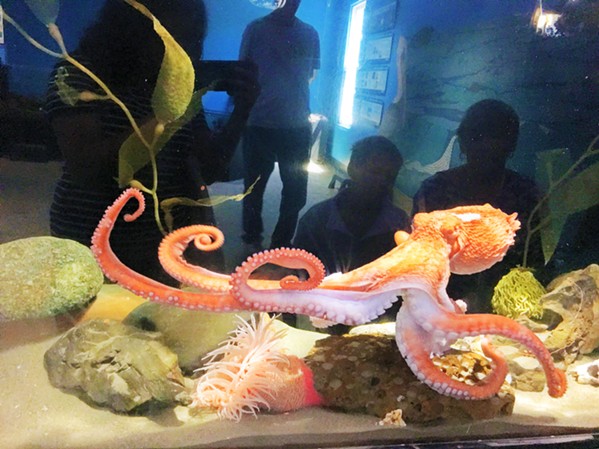The Central Coast Aquarium (CCA) underwent a temporary system shutdown on April 16 as a direct result of the coronavirus. But it doesn't mean the Central Coast Aquarium is dissolving, as the nonprofit has every intention of reopening.

- File Photo By Karen Garcia
- TEMPORARILY CLOSED The Central Coast Aquarium temporarily shut everything down on April 16, but the board is working on a reopening plan.
The former executive director of the facility, Christine Johnson, said in a statement that the decision was made due to a loss of revenue from both school field trips and the spring break tourism season.
At the time, the aquarium in Avila Beach didn't have any assurance that it would be able to reopen for business by the summer. According to Johnson's statement, as part of the temporary system shutdown, all animal care life-support systems and animal exhibits were shut down entirely and secured for future reopening.
"With care and attention, we released many of our animals back to the wild as permitted by the California Department of Fish and Wildlife. All remaining animals that could not be released to the wild were adopted by Cabrillo High School Aquarium in Lompoc," the statement read. "We are grateful for the partnerships with [Department of Fish and Wildlife] and Cabrillo High School who worked with us to ensure that the release or adoption of all of [Central Coast Aquarium's] animals was properly and ethically managed."
According to Johnson's statement, the aquarium had experienced its most successful year in 2019 and was ahead of 2019 numbers in January, February, and half of March of 2020.
"Yet, even with a fantastic year in 2019, our margins for operating as a nonprofit aquarium and marine science education center are very tight," the statement said.
In the statement, Johnson said there are those in the community in critical need, and it's correct for "philanthropy to be given to those nonprofits first." She listed food banks, domestic violence and child abuse services, and medical supplies for first responders and health care workers.
Johnson told New Times she couldn't give any updates, as she stepped down from her position on April 15, but she's happy to help the aquarium or volunteer when it needs her.
As SLO County continues to move toward reopening, the Central Coast Aquarium is also working on a plan to safely reopen to the public once again. Aquarium board Chair Debbie Collins said the board is meeting and talking about how to reopen and the programs that it'll be able to conduct safely.
Collins said she can't comment on the exact plan, but she's personally advocating for a safe and quick reopening. She said she can't comment on the Morro Bay Aquarium project at this time either.
The Central Coast Aquarium and city of Morro Bay had been collaborating on a new aquarium on the Embarcadero. The last project update was in February when the CCA funded developing the concept design for a plan that showed what the aquarium would look like.
For more information or updates on the aquarium, visit centralcoastaquarium.com.
Fast facts
• Farm Credit established an endowment fund of $255,000 at Cal Poly's College of Agriculture, Food, and Environmental Sciences. Six Farm Credit institutions serving farmers and ranchers throughout California contributed funding for the endowment. The annual proceeds will be used to pay for data and other resources that will enable student projects dealing with agricultural finance and lending, data analytics, and risk management.
• Community Action Partnership of San Luis Obispo County (CAPSLO) is selling raffle tickets to help raise funds in what they are calling the first Afternoon of Alternative Delights. In place of its in-person Afternoon of Epicurean Delights at the Chapman Estate in Shell Beach—an event that has been held for 33 years—the alternative event will be virtual and broadcast via Facebook Live on July 19 at 10 a.m. Funds raised by this event support CAPSLO health and prevention programs, which provide health and education services for low-income, underserved, and vulnerable individuals through the county. Proceeds go toward direct service, including preventative health screening for seniors and vulnerable adults; sexual health and wellness education in schools; free laser removal of anti-social and gang-related tattoos; and comprehensive reproductive health care. To view raffle prizes and purchase tickets, visit capslo.org/aed. Δ
Staff Writer Karen Garcia wrote this week's Strokes. Send tidbits to [email protected].
Comments